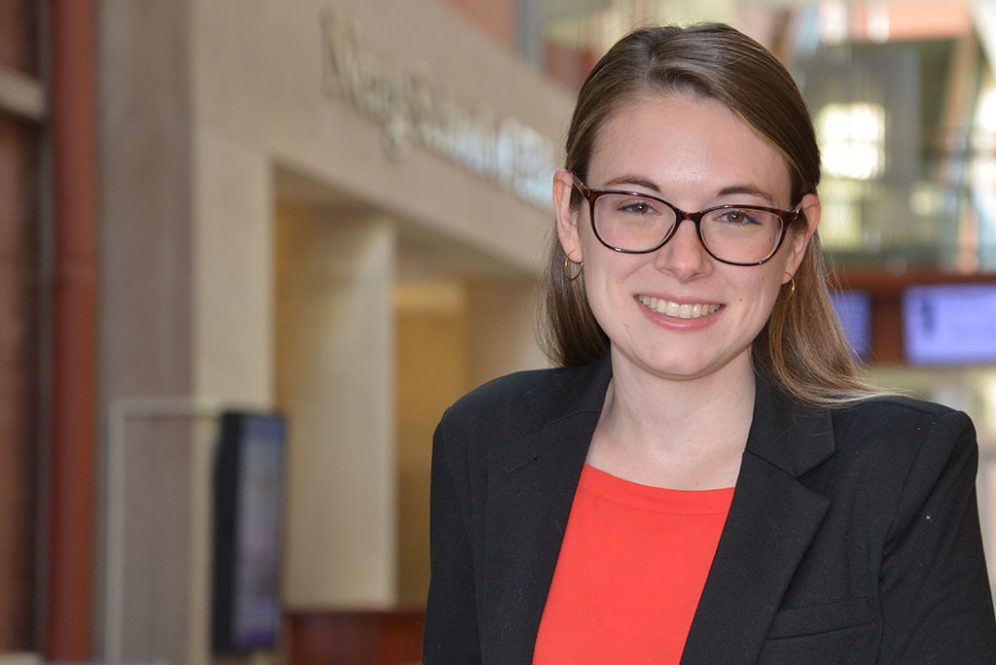Ashley Taconet is a Ph.D. student in the UConn Neag School of Education’s Department of Educational Psychology studying Special Education. After attending college with the goal of being a second grade teacher in an inclusive classroom, she became interested in pursuing her Ph.D.
Q: Where did your interest in special education originate and how did you come to realize that you wanted to pursue a Ph.D. in that field?
A: My interest in special education started when my younger cousin was diagnosed with autism in 2009. I attended college for special education with the goal of being a second grade teacher in an inclusive classroom. That college had an inclusive higher education program, or a college program for people with intellectual disability. I had never heard of these programs before then. I ended up working for the program through college and became interested in ensuring these programs were providing positive post-school outcomes for the students. I felt that the best way to meet that goal was by pursuing my Ph.D.
Q: What is the focus of your dissertation research? What about this particular topic interests you?
A: My dissertation is focused on understanding independent living skills for transition-aged youth who are about to leave high school to attend higher education, work, etc. I am also looking at student differences based on disability, race, or ethnicity and its relation with economic hardship. I am specifically interested in independent living skills because they are skills that can help students excel in all areas of post-school life (employment, higher education, etc.). My favorite example is transportation. It is an independent living skill needed to get to doctors’ appointments (independent living), etc., but is also needed to get to work (employment) or get to classes (higher education). I also think that trying to understand differences based on student characteristics (disability, race/ethnicity, economic hardship, etc.) is important so that we can provide targeted support to students most in need.
I knew that I wanted to work with the faculty [at the Neag School] because their interests aligned with mine and they were able to provide varied teaching and research experiences.
Q: What are your future career goals? How do you envision your Ph.D. helping you to meet those goals?
A: My future career goal is to continue research on transition-aged and college students with disabilities. I see myself working in either a professor role or at a research organization. The position I am interested in would not be an option if I hadn’t had the training I received through my Ph.D.
Q: What have you found most valuable about your experience in the Neag School’s special education doctoral program?
A: For me, the most valuable experience in my doctoral program was the chance to learn how to conduct research and take part in a research team. I am lucky to have worked on an IES grant for my advisor to create a measure of college and career readiness. I was able to see the whole research process from creating the measure to field testing and evaluating it. I have also been lucky to take part in a wide variety of research, both quantitative and qualitative.
Q: How has your perspective changed over the course of your time in the special education doctoral program, or what important lessons have you learned?
A: Coming into this program my interests were broad but more surface-level. Throughout the program, I was able to narrow my interest to a few select areas and have greater knowledge in those areas. I also learned what kind of research I was interested in conducting. Prior to attending the program, I did not see myself as inclined to do quantitative research. After taking the great methods courses here, I have found that quantitative data is my method of interest.
Q: Why did you choose the Neag School for your doctoral program?
A: The main reason that I chose the Neag School was because of the professors. I knew that I wanted to work with the faculty here because their interests aligned with mine and they were able to provide varied teaching and research experiences. The Neag School also provided very strong funding options during my duration in the program.
Q: What advice would you give to those who may be interested in pursuing a Ph.D. through the Neag School’s special education program?
A: I would strongly suggest reaching out to faculty who have similar interests to you. I reached out to my current advisor before applying to the program and it helped solidify that the Neag School’s special education program was a good fit for me.
To learn more about the Neag School of Education’s doctoral programs, visit education.uconn.edu/doctoral. Follow the Neag School on Instagram, Facebook, Twitter, and LinkedIn.



